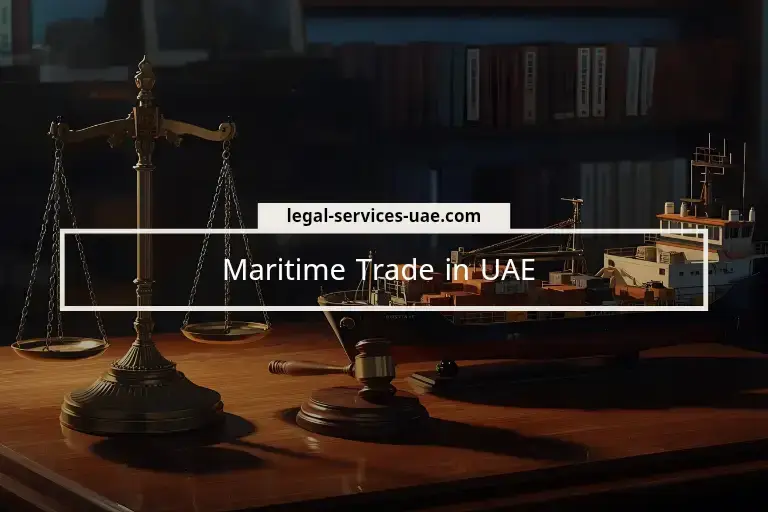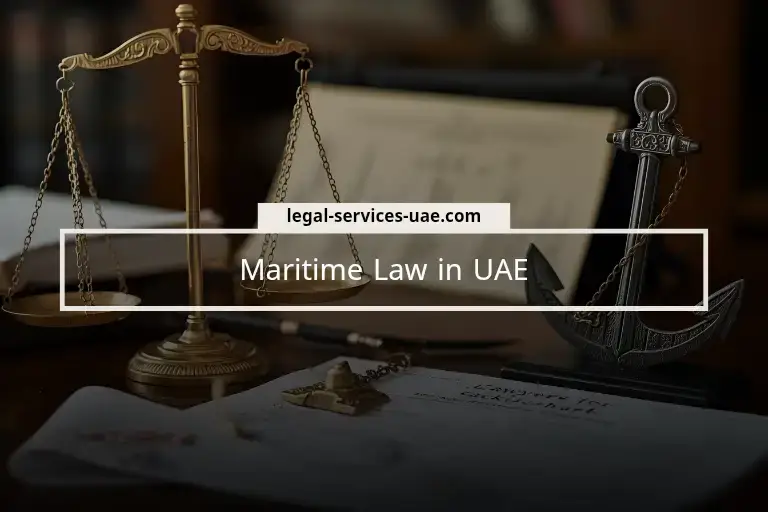The United Arab Emirates’ rise as a maritime powerhouse is no accident: strategic foresight, bold infrastructure investment, and clear regulation have made maritime trade in UAE one of the most dynamic sectors in global shipping and logistics. For businesses navigating this complex landscape, engaging a maritime lawyer in Dubai or other specialist lawyer in UAE is essential to ensure compliance, mitigate risk, and seize opportunity under the evolving regime of maritime law in UAE.
Maritime trade in the UAE is now governed by new legislation that came into force in 2024, significantly strengthening the legal foundations for vessel registration, liability, chartering, and enforcement. Understanding these legal and regulatory layers is critical for anyone trading via UAE’s ports or waters.
Need legal clarity before entering the UAE shipping sector? Click on the WhatsApp icon below.
فهرس المقال
The Pillars of Strength: Why the UAE Dominates Maritime Trade
The UAE’s dominance in global maritime commerce stems from its strategic planning and long-term investments. Here’s what makes the nation a logistical superpower.
Unmatched Geographical Advantage
The UAE occupies a pivotal position at the crossroads of East and West, sitting on major sea routes that link Asia, Africa, and Europe. Ports on both the Arabian Gulf and the Gulf of Oman give access to key maritime corridors.
Proximity to the Strait of Hormuz and to the emerging logistics hubs of the Indian subcontinent makes the UAE exceptionally well placed for transshipment, re‑export, and global supply chains.
World‑Class Port Infrastructure
Ports such as Jebel Ali, Khalifa, Port Rashid, and those in Fujairah combine depth, efficiency, and scale. Vessel turnaround times are competitive; facilities for container, bulk, oil and gas, and specialized cargo are all state of the art.
Free zones attached to the ports provide customs and tax advantages, warehousing, and logistical integration which attract shipowners, charterers, and traders alike.
Business‑Friendly Ecosystem
The UAE’s economic policies facilitate foreign investment, free zone setups, and international partnerships. Initiative after initiative supports trade, including simplified customs procedures, incentives for logistics technology, and regulatory reforms.
Importantly, the legal framework has been updated recently to provide clarity and protections under maritime law – something that a maritime lawyer in Dubai can guide clients through in detail.
The Legal & Regulatory Framework for maritime trade in uae
The legal foundations for maritime trade in UAE have recently been modernized under Federal Decree‑Law No. 43 of 2023 on Maritime Law, which came into effect in March 2024.
This new law repealed the old law (Federal Law No. 26 of 1981) and introduces key updates that affect how vessels are registered, owners are defined, liabilities limited, and vessel arrests are handled.
Some of the main legal mechanisms include:
- Vessel Registration & Ownership: Broader eligibility criteria have been introduced. Vessels can now be registered under UAE flag by entities with a domicile or business centre in the UAE, including companies with foreign shareholders in some cases; and age limits and other technical parameters have been clarified.
- Liability & Limit of Claims: The new law aligns more closely with international conventions (for example, the LLMC 1996 Protocol) regarding limitation of liability for maritime claims.
- Chartering, Arrest & Preventive Measures: Charterparty definitions and obligations, arrest procedures, and interim remedies have been revamped. Preventive arrest of vessels and the capacity to register vessels under construction have also been addressed.
- Regulation at Emirate Level: Dubai, for example, has its own law (Law No. 3 of 2023 concerning the Dubai Maritime Authority) governing maritime safety, licensing, and oversight of vessels in waters of the emirate.
For any business or shipowner, working closely with a maritime lawyer in Dubai or other jurisdictions in UAE ensures that contracts, registrations, liability exposures, and compliance are properly managed under the current maritime law framework.
Opportunities & Growth Areas
The UAE’s maritime sector is not just stable—it’s growing. Investors and businesses should keep an eye on these high-potential areas.
From green shipping and offshore services to digital trade platforms, the UAE continues to lead the charge in maritime innovation. Its legal environment now supports new ventures and sustainable practices, paving the way for long-term profitability in maritime trade in UAE.
- Green Shipping & Environmental Standards: UAE is pushing to adopt more sustainable maritime operations, including cleaner fuels, stricter emissions rules, and protection of marine ecosystems.
- Logistics & Supply Chain Hubs: Expansion of Free Zones, inland ports, and intermodal links offers commercial opportunities in warehousing, distribution, and forward services.
- Offshore Services & Vessel Support: Oil & gas, renewable energy offshore, marine services such as crew change, bunkering, maintenance.
- Digitalization & Automation: Port management systems, digital customs, blockchain documentation, and electronic ship registration can streamline operations and reduce friction.
- Regional Trade Agreements: The UAE’s trade relations with GCC neighbours, Asia, Africa, and Europe continue to open markets for goods moved by sea.
Challenges of maritime trade in UAE and Considerations
Despite its advantages, doing business in UAE waters comes with its complexities. A legal misstep can be costly.
Operators must stay alert to changes in local and federal laws, vessel compliance issues, liability caps, and environmental obligations. It is strongly advised to consult a maritime lawyer in Dubai when structuring maritime agreements, resolving disputes, or registering vessels under UAE law.
1. Regulatory Complexity & Transitional Period
With the new Maritime Law only recently in effect, executive regulations, procedural guidelines, and regulatory practice are still being fully developed. Discrepancies between federal and emirate‑level jurisdiction (like Dubai) can sometimes create overlapping requirements.
2. Vessel Age & Flagging Requirements
Older vessels or those not meeting new technical criteria may face barriers to registration under the UAE flag. Charter agreements involving foreign‑flagged ships may need careful contract drafting.
3. Liability & Risk Exposure
The limitation of liability regime, while improved, still requires attention to international conventions, insurance cover, and the precise terms of contracts. A lawyer in UAE with expertise in maritime claims is crucial.
4. Environmental Compliance
Global and local environmental rules are tightening. Non‑compliance (pollution, ballast discharge, waste, emissions) can lead to both legal penalties and reputational risk.
5. Geopolitical & Maritime Security Risks
Piracy, regional conflicts, straits and chokepoints pose navigational risks; insurance, risk allocation in charter parties, and force majeure clauses are especially important.
FAQ
Maritime trade in UAE continues to stand out on the world stage: legal reforms like Federal Decree‑Law No. 43 of 2023, enhanced port capacities, and pro‑business policies create a strong foundation for growth under modern maritime law. For investors, operators, or shipowners considering entry or expansion, retaining a maritime lawyer in Dubai or other trusted lawyer in UAE with sector‑specific expertise is not optional but essential. By doing so, one can navigate the legal, regulatory, and operational complexity and fully leverage the opportunities that maritime trade in uae now offers.
Need legal support for your maritime operations in the UAE? Contact us now via the WhatsApp button below and speak with a licensed lawyer in UAE.
Disclaimer: This article is for educational purposes only, and does not constitute legal advice. For tailored guidance on maritime trade in the UAE, contracts, liabilities or regulatory issues, consult a qualified maritime lawyer in Dubai or elsewhere in the UAE.
Legal Sources:
- Federal Decree-Law No. 43 of 2023 on Maritime Law, published March 2024
- Law No. 3 of 2023 concerning the Dubai Maritime Authority
- Ministry of Energy and Infrastructure – Maritime Sector Initiatives
Was this helpful?
Specialized Legal Content Writer, possessing deep legal knowledge and exceptional ability to demystify legislation and analyze judicial developments. He delivers clear, precise content that helps you understand your legal rights and obligations while empowering you to make informed decisions across diverse legal domains. Working within our expert legal team, he ensures credibility and trustworthiness in every piece of content.





Alright lads, gave taya3653 a whirl. Registration was super quick and easy. Had me betting in minutes! Give it a look if you’re short on time. More info at: taya3653
Hitclubgames8… That ‘8’ makes me think of lucky numbers! Hoping this site brings me some good fortune. Gonna try my luck on some of their games. Wish me luck y’all! You can explore it here: hitclubgames8.
Looking for the zo88 apk download? Heard some buzz about it. Gonna grab it and see if it lives up to the hype. If you are like me, give it a go! zo88 apk download
Yo, NustargamePH! This one’s geared toward the Philippines, yeah? Fast payouts and a decent selection of local games. Check it out, kabayan! nustargameph.
GGWin, eh? Signed up yesterday. Layout is decent and found a few good bets. Withdrawals were prompt, which is always a good sign. Could use some more promotions though. Worth a look see. ggwin
77pub: Premier Philippines Online Slot & Casino Games. Easy 77pub Login, Register, and App Download to Win Big Today! Experience the best at 77pub, the premier Philippines online slot and casino platform. Fast 77pub login, easy 77pub register, and 77pub app download to win big today! visit: 77pub